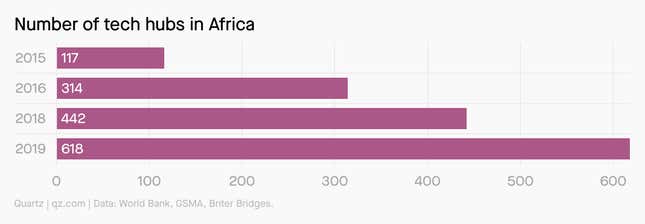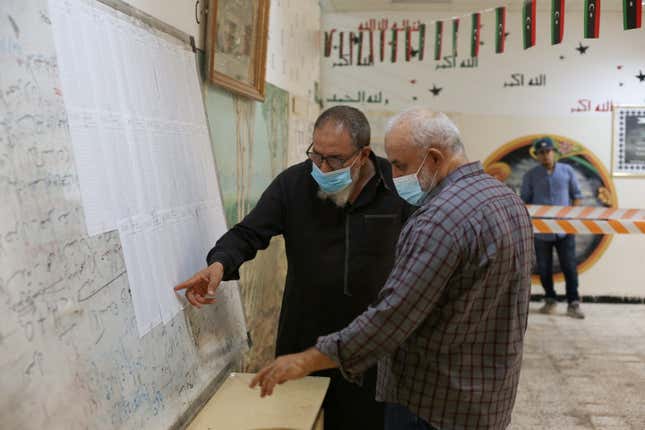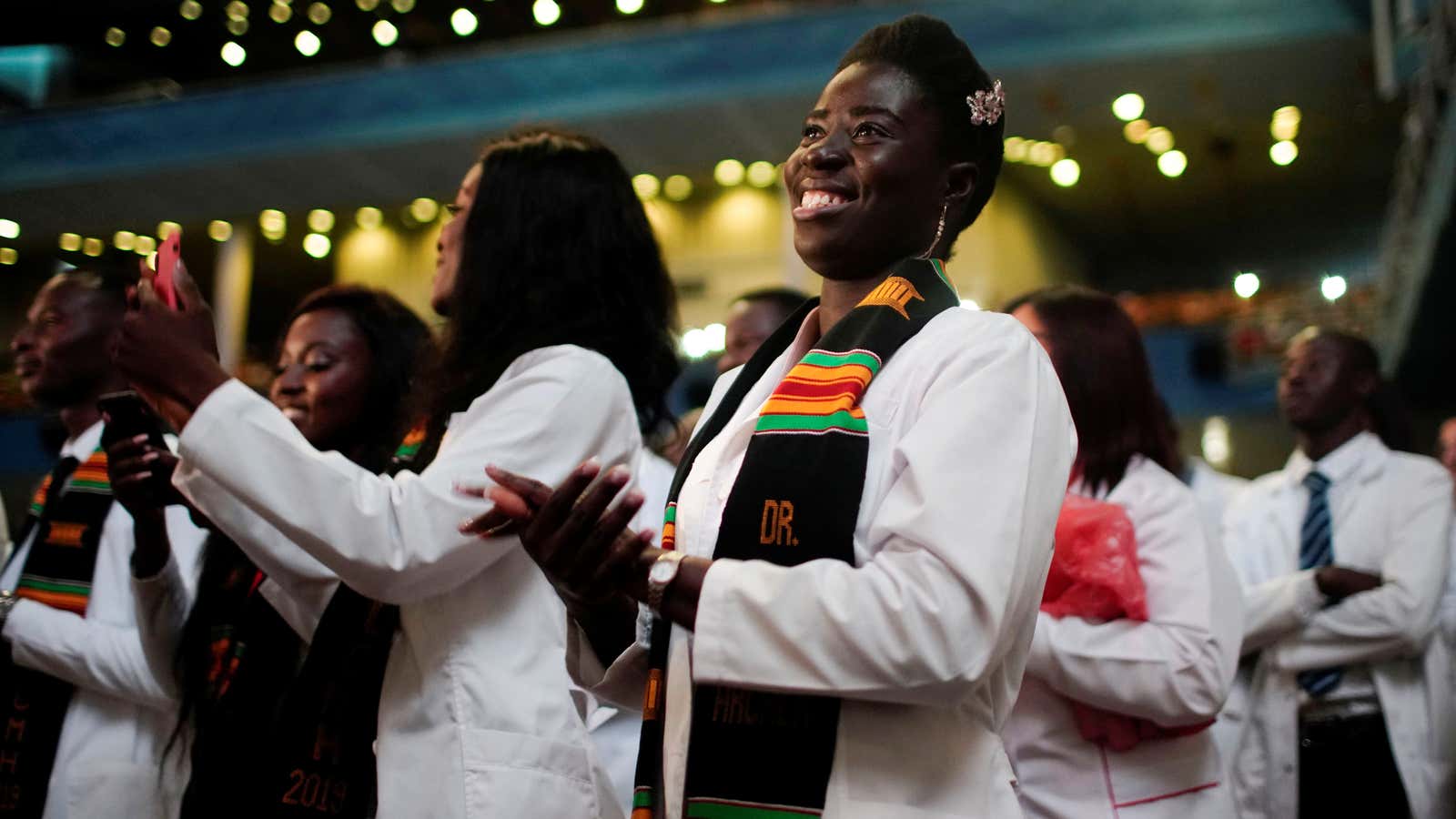Hi Quartz Africa readers!
Between 2015 and 2019, the number of tech hubs in Africa soared. But expectations for what a tech hub should be are changing. It is no longer enough for hubs to be glorified coworking spaces offering so-called incubation programs. Hubs are being pressed to actively drive African startups towards scale and success.
Creating a continent-wide standard is not an easy task, considering the different economic realities, and ecosystem maturity in each country. But the role has somewhat fallen to AfriLabs, a private organization founded in 2011, which has more than 320 hubs in 51 countries in its network. One of its current projects is an Africa-focused hub management curriculum in partnership with Kenya’s Strathmore University. It also launched Catalytic Africa, a project to co-invest in startups with African angel investors.

As AfriLabs executive director Anna Ekeledo described it to Quartz, the organization offers startups more than just electricity, internet, and office space. Membership also includes business advisory and legal services, access to mentorship and investors, and policy advocacy. As startups mature, they will find more ways to fill these needs. But Ekeledo expects hubs to remain relevant in the future by evolving to meet new needs.
“I really do hope that in 10 years time, tech skills will be part of every university curriculum to close the current talent gap,” she says. “So that hubs can focus on extremely advanced technologies and not basic skills.” —Alexander Onukwue, west Africa correspondent
Stories this week
Europe donates near-expired vaccines to Nigeria. The Africa CDC spoke recently about why mass donations of coronavirus vaccinations to Africa were failing, including their short shelf life. This past week, damning evidence on this phenomenon emerged when it was revealed that Europe hoarded 1 million doses of AstraZeneca’s covid-19 vaccine, then donated them to Nigeria right before they expired, Annalisa Merelli reports.
Oxford’s youngest Black female to get tenure is Kenyan-born. Ananya Bhattacharya examines how the prestigious British university’s appointment of Patricia Kingori to a full professorship makes the sociologist the youngest Black woman ever to receive tenure at Oxford or Cambridge.
A startup bill gets the go-ahead in Nigeria. Alexander Onukwue reports that a bill aimed at creating a better regulatory environment for startups in Nigeria will now go to parliament, where it could become law. The Nigeria Startup Bill is the result of collaboration between investors, entrepreneurs, law firms, policy advocacy groups, and representatives of the federal government.
The UK scraps its “red list” of restricted travelers from Africa. The UK has now reversed the highly criticized move to place various African countries on its travel “red list” due to the omicron variant. Courtney Vinopal explains why.
Senegal subtly wins the jollof wars. No topic has been as fun a source of west African drama as the jostling over which country makes the best jollof. The #jollofwars have turned Nigerians and Ghanaians from friends to foes, but also united them in their vexation at British celebrity chef Jamie Oliver’s twist on the famous rice and meat dish. Uwagbale Edward-Ekpu reports how Senegal’s recent listing of thiéboudiène by Unesco is a win for the country that gave the world jollof rice.
Watch out for….

Up to 90% of southern Africa’s material cultural legacy is outside of the continent, according to a French government-commissioned 2018 report. And the world’s former colonial powers can no longer escape the calls for restitution. While the focus of the recent debate has been on artifacts, Priya Sippy shows how some activists are now turning their attention to African films that remain in the hands of Western institutions.
Which classic African films would you recommend? For editor Ciku Kimeria, it’s La Noire de…, a 1966 film often translated as Black Girl (pictured above) by the revered Senegalese director Ousmane Sembène. It was the first Sembène film she watched, and it left her wondering why she had never heard of him before. For editor Jackie Bischof, it’s Gavin Hood’s Tsotsi (more a goodie than an oldie.) The critically acclaimed 2005 movie won an Oscar for best foreign language film and showcased what South Africa’s fledgling film industry could achieve with limited resources.
Email your recommendations to africa@qz.com. While you’re at it, let us know which Quartz Africa stories left an impression on you this year, and what would you like us to cover more of next year. Finally, was there a chart—on Quartz Africa or elsewhere—that helped you better understand the world? Let us know!
✦ If you’re interested in a Quartz membership, you can sign up now for a seven-day free trial. Membership will give you access to the best charts of 2021, film recommendations, the latest on Africa’s restitution debate, and a whole lot more. Want to see exactly how much more? Try it today.
One big number
40%
That’s the proportion of university scholarships that Africans who study abroad are getting from China, making the country the largest single provider of university scholarships to students from southern Africa.
The wide availability of Chinese government scholarships for PhD students in particular has fueled this trend. The university application process for Chinese students is also relatively straightforward, especially when contrasted with universities in the US and Europe, where foreign students are frequently met with rejections or less generous offers.
Natasha Robinson and David Mills report on how China is changing the culture of universities in Ghana, where, for example, 800 Ghanaians were studying for PhDs in China by 2018, up from 200 the year before.
Dealmaker
Alitheia IDF, one of the first and few women-focused investment funds in Africa, said it has reached a final close of $100 million. European Investment Bank (EIB) joined as the closing investor with $24.6 million. Founded by South African and Nigerian investors, Alitheia IDF has so far led investment rounds in five women-led African businesses: Jetstream Africa (Ghana), ReelFruit (Nigeria), SKLD (Nigeria), AV Light Steel (South Africa), and Chika’s Foods (Nigeria).
Edukoya, a new Nigerian online learning platform, raised $3.5 million in a round led by Target Global. Other investors include Paystack CEO Shola Akinlade, Kuda bank CEO Babs Ogundeyi, and other angel investors. Edukoya is founded by Honey Ogundeyi, a former chief marketing officer at Kuda bank and former country manager of the UK-Nigeria tech hub.
Google said it has invested in SafeBoda, making the Ugandan bike-hailing startup the first to receive investment from Google’s $50 million African startup fund announced in October. The amount is undisclosed, but it grabs attention by virtue of being a non-fintech company outside the four countries (Nigeria, Kenya, Egypt, and South Africa) that tend to receive the largest share of startup investment in Africa.
Quartz Gems
We asked, they answered. At a Quartz at Work (from anywhere) workshop last week, our reporter Cassie Werber put the question of how to have a career in social impact to a panel of experts, including Quartz Africa 2021 innovator Jihan Abbas. The panel brought together a host of experiences across a range of industries and shared plenty of advice. Some of the key takeaways: You don’t have to solve all the world’s problems all at once. You do need to cut through the noise. And perhaps most important of all, you do need to be brave!
You can review our full workshop series here, or watch a replay of the social impact workshop here.
Not yet a Quartz member? Sign up now for a 7-day free trial.
Other things we liked
A world-famous African musical genre wins protected status. Unbeknownst to many, the origin of one of the world’s favorite Latin dances—rumba—is actually the ancient kingdom of Kongo, now the Democratic Republic of Congo and neighboring Congo-Brazzaville. Congolese rumba now enjoys the same Unesco protected status as Jamaican reggae, Reuters reports.
Using a Nobel prize to wage war. For the New York Times, Declan Walsh examines how Ethiopia’s prime minister Abiy Ahmed used the dignity of his Nobel Peace prize to fuel a war that is edging Africa’s second most populous country towards catastrophe.
An artist discovers TikTok’s power. For TechCabal, Sultan Quadri writes about what the success of 1da Banton, a Nigerian singer/songwriter whose “No wahala” became a soundtrack to more than 190,000 TikTok videos, means for other African artists seeking exposure.
Keep an eye on

Libya hopes to attain stability in its upcoming elections. Libyans take to the polls on Dec. 24, seeking to unify the country after a decade of civil war. The winner of the elections will become Libya’s first elected president since the overthrow and killing of Muammar Gaddafi a decade prior.
🎵 This brief was produced while listening to “Eloko Oyo” by Fally Ipupa (DRC)
Our best wishes for a productive and ideas-filled week ahead. Please send any news, comments, suggestions, ideas, jollof rice recipes, and your favorite rumba tracks to africa@qz.com. You can follow us on Twitter at @qzafrica for updates throughout the day.
If you received this email from a friend or colleague, you can sign up here to receive the Quartz Africa Weekly Brief in your inbox every week. You can also follow Quartz Africa on Facebook.
